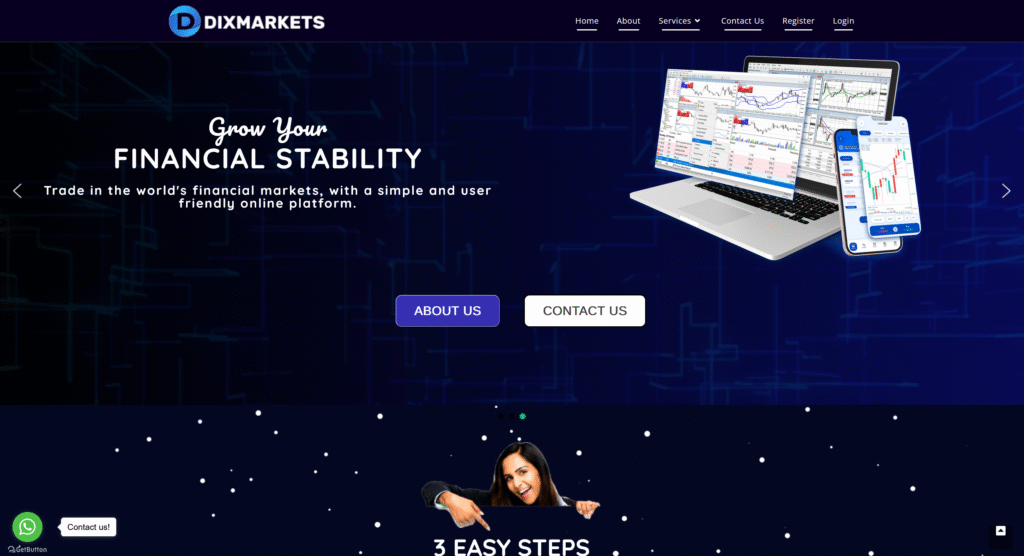1. No Valid Regulation & Labelled “SCAM” by Broker Analysts
One of the most alarming findings about DixMarkets is that it lacks credible regulatory oversight. BrokersView, a specialist site, lists DixMarkets as “SCAM” because it “does not display any clear regulatory information” and there is no record of it being registered with reputable authorities in the U.S. or elsewhere.
They state that the operator claims to be “DixMarkets LTD” in the U.S., but verification searches in the National Futures Association (NFA) and other major registries yield no match.
This absence of licensing means that, legally and practically, DixMarkets operates without standard industry checks on behavior, financial audits, or dispute resolution safeguards.

2. Very Low Trust Score & Alarms from Scam Checking Tools
ScamAdviser flags dixmarkets.com with a very low trust score, citing factors such as hosting in a high-risk location, domain registration issues, and association with other suspicious websites on the same server.
According to their analysis, the site may run high-risk financial services, has minimal transparency, and might even be structured like a HYIP (High Yield Investment Program) — which often indicates a fraudulent or unsustainable model.
Combined, that means multiple automated tools are raising red flags independent of user reviews.
3. User Reviews a Strong Negative Warning
On Trustpilot, users have written scathing reviews about DixMarkets. Some quote experiences of being unable to withdraw funds, others of being “stealing money,” calling the company “cheaters and liars.”
One reviewer said: “These people have been stealing money from me. They are real scam, don’t trust this company at all.”
These firsthand accounts reinforce that the theoretical risks pointed out elsewhere are manifesting in real losses for some users.
4. Aggressive Promises & Unverifiable Claims
DixMarkets markets itself as an automated, all-in-one trading solution promising easy profits and rapid payouts. But Brokers Reviewer points out that those claims are standard in unreliable platforms — hype designed to lure people in before the trouble begins.
When a platform promises “easy payout,” “guaranteed gains,” or “effortless returns,” those are common marketing signals of high-risk or fraudulent models. Real markets don’t work that way; no legitimate broker can ensure constant profits without risk.
5. Withdrawal Issues & Exit Barriers Likely
Based on user feedback and review patterns, it’s highly probable that DixMarkets imposes serious barriers when users attempt to withdraw money. Common tactics include:
- Asking for additional “compliance” documents not originally requested
- Imposing surprise fees, “processing charges,” or mandatory trading volumes
- Delays, account freezes, or refusal of requests
Because the platform is unregulated, victims have almost no formal recourse when funds are locked or withheld.
6. Risks Amplified by Anonymity & Weak Hosting
The fact that DixMarkets is hosted on a server with other suspicious sites and uses domain registration practices that mask ownership raises concerns. ScamAdviser’s analysis highlights “other suspicious websites on this server” as one risk factor.
This pattern — clustering of questionable sites under shared hosting — is a known method fraudsters use to reduce costs and rotate domains quickly when one is exposed.
7. High Probability of Loss & Low Accountability
All of the above – lack of regulation, low trust scores, negative user testimonies, aggressive marketing, withdrawal friction, and anonymity — point to a platform with very high risk of loss and little accountability.
If DixMarkets fails, vanishes, or refuses to return funds, users may find themselves powerless to complain, pursue legal action, or recover their investments. That is not speculation — it’s the typical result in cases of unregulated, high-risk trading platforms.
Conclusion
DixMarkets (dixmarkets.com) is a textbook case of a platform that exhibits multiple, well-known warning signs of a fraudulent broker. The lack of any credible regulatory registration is perhaps the strongest red flag — it means the platform operates without oversight, accountability, or consumer protection mechanisms. BrokersView, which tracks broker legitimacy, explicitly labels DixMarkets as “SCAM” because it fails to show any valid licensing.
Augmenting that, tools like ScamAdviser categorize the site with a very low trust score, pointing to hidden ownership, hosting connections with other suspicious sites, and a risk profile consistent with high-yield or HYIP entities.
Then there are the real voices — actual users who allege they have been denied withdrawals, had money stolen, or felt scammed. Trustpilot reviews include language calling the company “the worst experience in my life,” alleging theft, and strongly warning others not to trust them.
Where a legitimate firm offers documentation, transparent processes, public disclosures, and verifies its credentials, DixMarkets offers opacity, pressure, and unmet promises. The marketing style — boasting effortless profits, “easy payouts,” and broad market access — matches many patterns used by deceptive operators, as noted in comparative reviews.
If you’re considering investing or trading with DixMarkets, here’s a checklist of what to do (and what to avoid):
- Do not deposit any large amounts. If you test it, only use money you can afford to lose.
- Try a small withdrawal early to see whether the system honors it.
- Record and document everything — communications, screenshots, transaction IDs.
- Search official regulator registers (FCA, SEC, ASIC, etc.) to see if DixMarkets or its owners are registered.
- Avoid promises of guaranteed returns or zero risk. That is a red flag in any financial context.
- Report suspicions to authorities (FCA, local financial consumer protection, or your banking institution).
- Warn others — your experience might prevent someone else from falling victim.
In the digital financial age, scams are increasingly polished. Slick websites, AI popups, cloned branding, and persuasive storytelling all contribute to false legitimacy. But beneath that veneer, the foundational elements of trust still matter: verified regulation, transparent ownership, consistent withdrawal behavior, and independent reviews.


